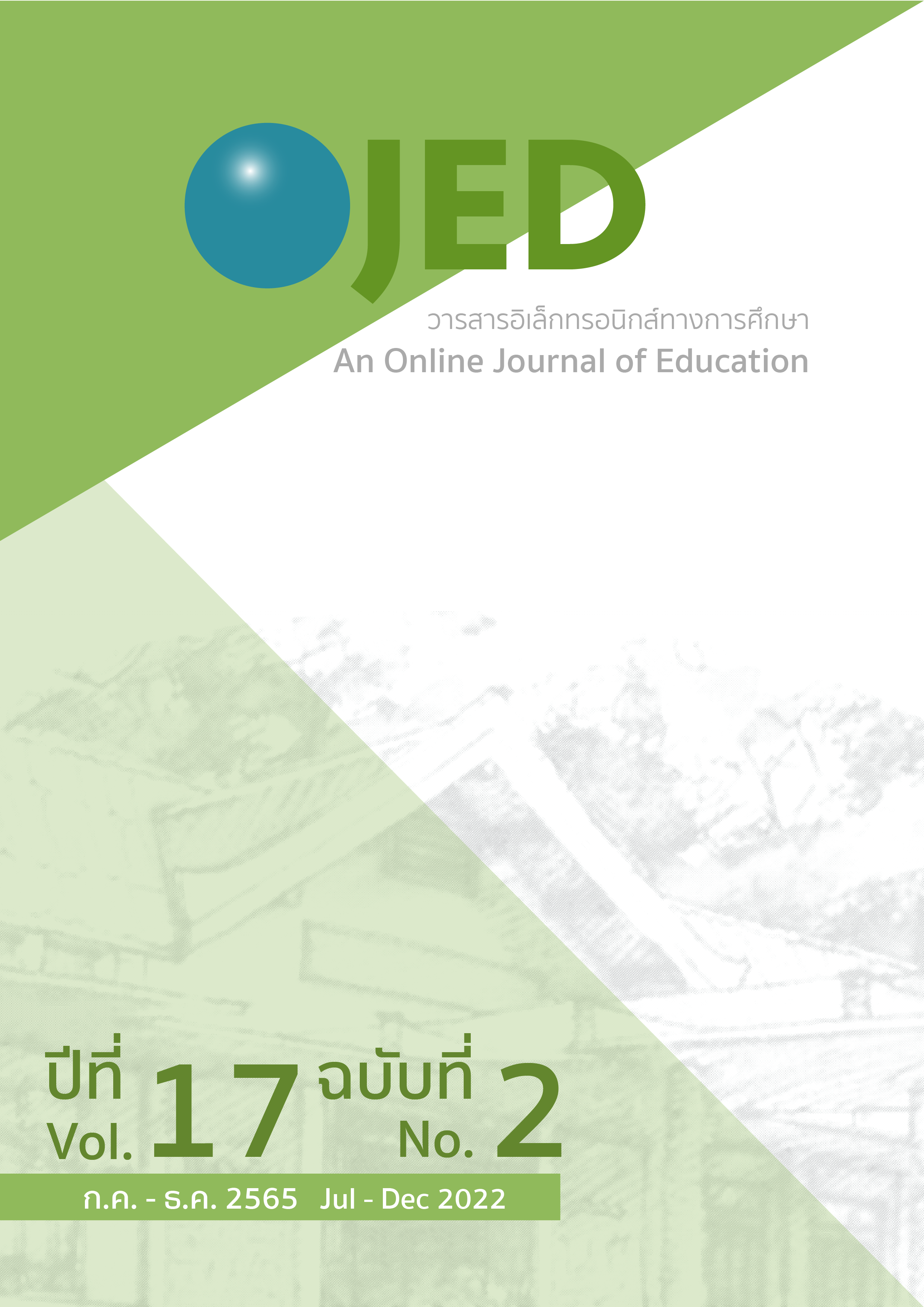The Effects of Parental Involvement on Storytelling with a Package of Role-Play Activities on the Growth Mindset of Early Childhood
DOI:
https://doi.org/10.14456/ojed.2022.50Keywords:
growth mindset, activities package, storytelling, role-play, parents, young childrenAbstract
The purpose of this research was to study the effect of parental involvement on storytelling with a package of role-play activities on the growth mindset of early childhood. The target groups included 6 young children, 5-6 years old and 6 parents of the target group. In addition, the parents had to have knowledge and the ability to use technology to communicate. The research instruments consisted of: 1) plans on using storytelling activity provision with role plays and parental involvement on the growth mindset of early childhood; 2) an assessment form on the growth mindset of early childhood;
3) a behavioral observation form for parents on the growth mindset of early childhood; 4) a satisfaction questionnaire and suggestions from parents; 5) an assessment form for parents on knowledge, understanding, and attitudes on the growth mindset; and 6) an unstructured parental interview form. The obtained data were analyzed by mean, standard deviation, and content analysis. The results showed that 1) children had a higher growth mindset after the experiment than before; 2) children’s growth mindset on the aspect of the success of others increased the most; 3) the story in the activity package that children paid the most attention was Khun Rabbit's Tailor Shop; 4) parents had average scores for knowledge, understanding, and attitudes towards a growth mindset were higher than before the experiment.
5) parents were satisfied with the activity packages at the highest level of 80.95% and the lowest level at 19.05%, parents see their children have more open-minded and more efforts.
References
เกริก ยุ้นพันธ์. (2547). การเล่านิทาน. สุวีริยาสาส์น.
จีรนะ ดวงภูเมฒ. (2561). การพัฒนาการจัดกิจกรรมเล่านิทานประกอบการแสดงบทบาทสมมติ เพื่อส่งเสริมความเชื่อมั่นในตนเองของเด็กปฐมวัย [วิทยานิพนธ์มหาบัณฑิต]. มหาวิทยาลัยราชภัฏมหาสารคาม.
รสสุคนธ์ อยู่เย็น. (2557). ผลของการจัดกิจกรรมการเล่านิทานประกอบการแสดงบทบาทสมมติที่มีต่อความเชื่อมั่นในตนเองของเด็กชั้นอนุบาลปีที่ 2. วารสารวิชาการ (Veridian E-Journal), 7(2), 779 – 787. https://he02.tci-thaijo.org/index.php/Veridian-E-Journal/article/view/17169/23483.
ศรีเรือน แก้วกังวาล. (2553). จิตวิทยาพัฒนาการชีวิตทุกช่วงวัย แนวคิดเชิงทฤษฎี-วัยเด็กตอนกลาง (พิมพ์ครั้งที่ 9). กรุงเทพฯ: สำนักพิมพ์มหาวิทยาลัยธรรมศาสตร์.
สุรางค์ โค้วตระกูล. (2565). จิตวิทยาการศึกษา (พิมพ์ครั้งที่ 14). จุฬาลงกรณ์มหาวิทยาลัย.
Dweck, C. (2006). Mindset: The new psychology of success. Random House.
Dweck, C. (2009). Mindset: The New Psychology of Success. Ballantine.
Dweck, C. (2014). Teachers’ mindsets: ‘Every student has something to teach me’. Educational Horizons, 93(2), 10-15.
Enriquez, G., Clark, R. Summer & Calce, D. J. (2017). Using children’s literature for dynamic learning frames and growth mindsets. http://web.a.ebscohost.com.portal.lib.ku.ac.th/ehost/pdfviewer/pdfviewer?vid=2&sid=cc12a497-e4e0-4dad-9d8a- 4bdc340e2920%40sessionmgr4007.
Geert, D. (2019). Parental Involvement, parental participation, parent-school-community partnerships. Parental involvement, parental participation, parent-school-community partnerships. Encyclopedia, Education & Educational Research, (4). https://encyclopedia.pub/entry/105
Haimovitz, K., & Dweck, C. (2017). Parents’ views of failure predict children’s fixed and growth intelligence mindsets. Psychological Science, 27(6), 859-869.
Johnston, P.H. (2012). Opening minds: Using language to change lives. Stenhouse. http://2.droppdf.com/files/F2E8R/opening-minds-using-language-to-change-lives.pdf.
King, R. B. (2012). How you think about your intelligence influences how adjusted you are: Implicit theories and adjustment outcomes. Personality and Individual Differences, 53(5), 705-709.
National Parent Education Network. (n.d). NPEN Core Principles. https://npen.org/about- npen/core-principles.
Navarro, S. (2020). Modeling growth mindset: How parental involvement benefits student cognitive development. MATL Action Research Projects. https://digitalcommons.stmarysca.edu/cgi/viewcontent.cgi?article=1004&context=matl-action-research.
Schroder, H. S., Dawood, S., Yalch, M. M., Donnellan, M. B., & Moser, J. S. (2014). The role of implicit theories in mental health symptoms, emotion regulation, and hypothetical treatment choices in college students. Cognitive Therapy and Research, 39(2), 120-139. https://www.researchgate.net/publication/266023041_The_Role_of_Implicit_Theories_in_Mental_Health_Symptoms_Emotion_Regulation_and_Hypothetical_Treatment_Choices_in_College_Students.
Wright, W. L. (n.d). 11 Books to Help Kids Build a Growth Mindset. https://www.understood.org/en/friends-feelings/empowering-your-child/building-on-strengths /growth-mindset-books.
Downloads
Published
How to Cite
Issue
Section
License
Copyright (c) 2022 An Online Journal of Education

This work is licensed under a Creative Commons Attribution-NonCommercial-NoDerivatives 4.0 International License.




